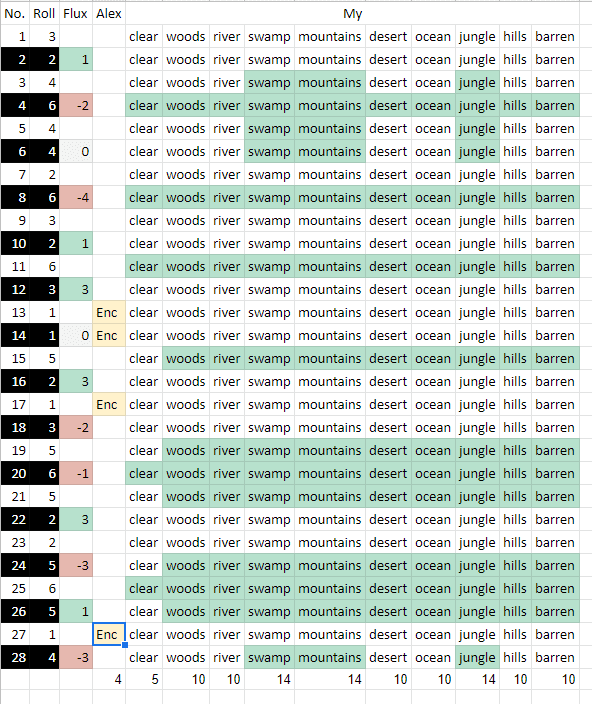In Hex Crawl pt. 1, I discussed the results of testing three different methods for determining the wilderness exploration experience for the hex crawl game I will be running.
Aside from the method used to determine random encounters, I also want to have things like weather, adverse/beneficial events, site discovery, and foraging occur as well, all without the necessity of making several dice rolls and consulting an ever-increasing number of tables.
The wilderness rules from Halberts & Helmets (hereafter referred to as "H&H") are simple and easy to use, but they don't help me with any of the exploration aspects I want to incorporate. The 17% chance of encountering anything (good or bad) limits their exclusive use as that would translate into days and days of travel with nothing happening unless I dictated (and I don't like doing that).
Moldvay/Cook B/X (hereafter referred to as "B/X") has more depth to the variety of encounters, but as presented they are "monster" encounters and so don't help with the exploration aspects, as well as proving to make travelling in the wilderness a near-certain death march for low-level characters.
I think the Traveller 5 flux mechanic can form the basis of the system I need. It can handle both beneficial and adverse results, and (good for me) serve as more of a narrative guide for a day's activity while exploring, all while making exceptional events less frequent (thus more memorable and potentially easier for my 1st level characters to deal with).
Using Flux
Rambling background
Before I outline the way I see flux working for me, I would like to explain a particular hang-up I have as a referee. I don't like dictating story beats, or guiding the narrative, or otherwise directing players. This has been my biggest hang-up when trying to run a game system like Numenera or other Cypher system games. I don't like the "GM intrusion" mechanic - it degrades the experience of what I would otherwise consider a great modern rules-light d20 system. I like to participate, as a player (of a different sort), rather than dictate. I prefer improvising when rolling randomly to determine an adverse or beneficial effect or situation, rather than trying to force a story beat or situation on players. I know, it doesn't really make sense in playing a game where I make stuff up for people. YMMV.
To use flux for my wilderness mechanic, I need to step away from details a bit and think more of the experience of a given day, as a whole. I have to direct things a bit more than I would normally prefer, but conversely I can tailor the individual day to exactly what the players are up to.
For example, presume the players have elected to spend a day foraging rather than travelling. In our game we've decided that players can forgo movement for a day, so that everyone can focus on gathering food or water or whatever. They have a base chance of 1 in 6 to gather 1D6 units of supplies), unless they are playing a thief in which case they have a 2 in 6 chance of gathering 1D6 units of supplies. The players can elect to do one roll for the entire group (using the highest skill), or break into smaller groups (each group using the highest skill), or even do it individually; it's all up to them to decide.
First, I have the players roll 1D6 - this is the "light" die in flux parlance. I likewise roll 1D6 (the "dark" die), and we determine flux.
Example 1: Flux -1
(-1 to skill checks)
The players know today may not be a good day for this - maybe the weather is terrible, maybe someone is having digestive issues, or maybe their hearts are just not into it. Regardless of why, they know that their chances of success today are reduced. Only skilled characters (thieves) even have a chance.
Example 2: Flux +2
(+2 to skill checks)
Today is gorgeous - the weather is beautiful, everyone feels great, plants and animals are in abundance, even the water looks clearer. This is a great day to gather the supplies.
Example 3: Flux -4
The players have had a restless night. There's been a lot of movement of some kind of creature or creatures in the area and maybe it's best to get out while they can, like all of the local wildlife (roll an appropriate encounter for the terrain). Or, someone is really sick from something they ate, and can't move. Or scavengers or vermin have eaten some of the party's supplies.
Example 4: Flux +5
Finding food or supplies presents no difficulty. Everyone can find whatever they need without making a check. In addition, one of the players has discovered a cave that holds the remnants of a couple of structures. They are solid enough that they can be treated as a safe area in the future. Investigating them might even yield some tools or artifacts from the ancient builders.
Example 5: Flux 0
Today is just a normal day for procuring food or supplies. No bonus or penalty applied.
Summary
So, using flux in this way is less procedural than I would normally prefer, but I find myself excited by the potential of this during game play. I can apply the effects of a flux roll based on what the players decide to do, and they know up front what sort of day it looks to be. I can still use random tables to determine things like ruins or encounters, but I also have some flexibility in what to apply. We'll see how it goes!
